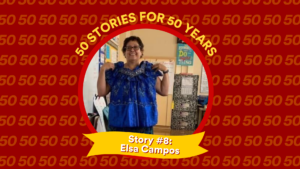 Story #8: Elsa Campos
Story #8: Elsa Campos
Today, we catch up with Elsa Campos. Campos has been a JEP partner for years – she’s a 4th-grade teacher at Vermont Avenue Elementary School, where she works with JEP to bring hands-on science lessons to her classroom weekly.
Campos’ first teaching assistant was Dieuwertje (DJ) Kast, JEP’s current Director of STEM Education Programs.
“It was my first year teaching at Vermont and my first year doing the [JEP] program… DJ was my teaching assistant, and I remember her bringing all of this stuff,” Campos says. “Stuff I couldn’t buy myself… different colors of clay, different materials for hands-on experiments.”
Campos works with a lot of students for whom Engish is a second language. She stresses the importance of these tactile lessons – they help make tricky concepts concrete.
“Especially working with English [language] learners – hands-on activities are so important. Abstract concepts like oxygen and photosynthesis can be hard to explain with just words, but having someone come from a university like USC and do these physical experiences make them easier to understand,” Campos says.
Campos originally came to the United States from El Salvador.
“I had a background in education there – my English teacher [here in the US] got me work as a teaching assistant, and I used to work with new students who didn’t speak English.”
“I saw the need to say to them that ‘eventually you’ll learn the language, immerse yourself and don’t give up,” she says. Despite offers to move into more administrative-focused roles within the education sphere, she says that witnessing her students’ progress is what keeps her motivated to stick with her current career.
“I love teaching – it’s the little rewards you see in students… how much progress they make. I tell my students to never give up, no matter how tricky it is.”
USC senior and JEP staffer Emma Case is Campos’ current teaching assistant. Campos praises her work with the students, who she says anxiously await their weekly lesson. Recently, Case led the students in making their own paper airplanes. The goal was to visualize concepts like force and velocity, and the students loved it.
“I had a student who started talking about velocity and relating it to velocity in baseball… how they could use these same concepts to hit home runs,” says Campos, who beams with pride as she recounts the impressive moment.
Campos also mentions that education gaps caused by virtual learning are being filled slowly by these exercises. A little frustrated, she recounts a moment this year when she realized her students didn’t know how to use a ruler. It was one small realization among many – pandemic learning left many of her students without critical skills that could trip them up later.
A lot of her students struggled to focus over Zoom, with many of them taking over parenting roles and learning in unfamiliar environments.
“[My students] would ask permission to get up to go and check on their siblings…” Campos remembers. “I heard, ‘I need to go. I need to check on my baby brother. He just woke up.’ They would sit next to the students during class while their parents were out running errands or at work.”
She says that JEP’s lessons have been invaluable in catching students up on these missing concepts. “Having someone come from a university like USC and do these hands-on experiences make them easier to understand.”
“The knowledge these TAs bring to the classroom and the connections they build with the students are amazing… I have teachers that have [Vermont] and gone to other schools where JEP doesn’t reach, and they miss it.”